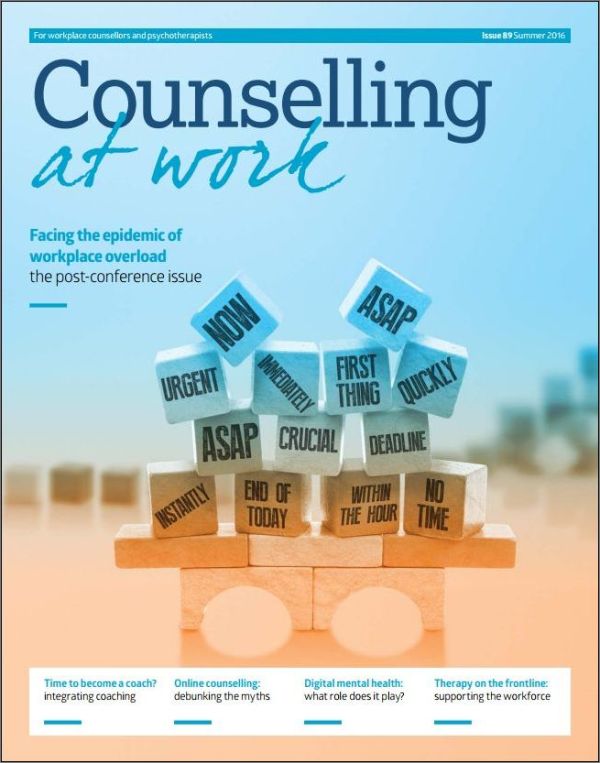In this issue
Features
Overload and collapse (free article)
Chris Johnstone addresses the epidemic of workplace overload
e-counselling: is it for you?
What are the pros and cons of e-counselling for clients, counsellors and organisations? Anne Stokes explains
Becoming a coach
Michèle Down and Steve Page provide some practical steps for practitioners looking to integrate a coaching approach
Conference review
Alison Paice offers her perspective on the BACP Practitioners’ Conference
Digital mental health @work
Aislinn Bergin talks to Nicola Banning about her research
Regulars
The bigger picture
Chair Elect, Nicola Neath – therapy on the frontline
Workplace matters (free article)
Sandi Mann – is it ever OK to cry at work?
Talking purple (free article)
Kate Nash – building disability confidence
EAP matters
Kevin Friery – supporting vulnerable clients
Service matters
Cindi Bedor – a question of safety

A pdf of this issue is available in the Counselling at Work archive
First words
A spirit of enquiry weaves through this post-conference issue of Counselling at Work, reflecting some of the questions explored by the speakers present at the BACP Practitioners’ Conference held in April.
Naming the epidemic of the modern age as ‘overload’, Dr Chris Johnstone opened the BACP Workplace strand to a packed room, keen to know how to address a phenomenon prominent in our clients’ workplaces and our own caseloads. Chris named this is as a systemic problem which is endemic in society; exacerbated by an austerity climate where services are both stretched and under resourced, when both demand and the requirement to deliver ‘excellence’ are increasing.
‘In crisis’ are two words used so frequently to describe the latest public service at breaking point that the context of people and systems working under these conditions is the new normal. This could have been rather depressing terrain. Yet it wasn’t. Chris was an out of the ordinary speaker in the best of ways; charming, funny and sensitive to the potential for burnout in a profession like ours, with a strong sense of vocation. Chris opened up new questions for thinking creatively about how we might respond to the problem of overload, either individually, at team level or organisationally. He shares his thinking here.
Digital mental health has a strong presence this issue. Anne Stokes revealed in her workshop how she entered into the world of e-counselling because she likes a challenge, and specifically because she wanted to prove that it wouldn’t work. Fifteen years later, as a therapist, supervisor and writer on e-counselling, she’s well placed to provide an overview of the pros and cons of offering it in a workplace context.
Aislinn Bergin discusses her research into people’s experience of digital mental health and how our clients’ digital selves can be brought into therapy. She cautions therapists about becoming too distant from our client’s life online, which can lead to missing opportunities to support the client.
With our connections in the business world, as workplace practitioners we are well resourced to integrate coaching into our practice, developing our skill set and earning opportunities. Michèle Down and Steve Page’s workshop proved to be a lively session and allowed for some beneficial mini coaching sessions with colleagues. They talked to me about making the journey from therapist to coach, and offered their tips for therapists looking to build a coaching approach.
Behind the scenes at BACP there has been a lot of activity, and organisational change is ongoing as BACP’s new programme for the next five years is rolled out. The concept of Counselling Changes Lives is central to the new strategy, which you may have read about in the May issue of Therapy Today, in which BACP Chair, Andrew Reeves, and Chief Executive Officer, Hadyn Williams, spoke about what it will mean.
It is still unclear how the new strategy might impact on the way the divisions will work. Tina Abbott, Chair, BACP Workplace, encourages you to share your thoughts about what is happening in your workplace and to tell us what you need from your division so that the Executive Committee can represent the views of our members to BACP.
Looking ahead, the emphasis on championing the counselling profession, as Hadyn Williams says in the May issue of Therapy Today, ‘is not for its own sake, but for the value it brings to society.’ As the working population ages and our working lives become longer, we need a psychologically healthy workforce with access to talking therapies. Chair Elect, Nicola Neath calls for BACP to work alongside BACP Workplace, to help to educate the public, employers and organisations about the benefits of employee support.
What does it mean to feel psychologically safe at work? This is the question Cindi Bedor addresses in her final column for ‘Service matters’. It’s a concept rooted in the culture of therapy and familiar to our profession, but translating psychological safety in a meaningful way for managers and leaders working in the cut and thrust of organisational life is a challenge. It’s why we need therapists employed inside our organisations, providing both a therapeutic presence and the skills to work to develop emotional literacy and embed it into the wider culture. Reflecting as a service manager, Cindi has shed light on how she works with her employer to do just that.
Last issue I made an appeal for a new writer to take over ‘Service matters’: it’s been awfully quiet. I’ve met enough of you to know that there’s a counselling service manager out there with a perspective to share about bridging the worlds of therapy and management. If you think this could be you, or you have an idea for a possible article, do drop me a line.
Writing less than a week after the EU referendum, we are facing growing uncertainty and divisions in our society: the prospect of further cuts to our public services, a recruitment freeze and job losses all being predicted. In such an uncertain climate, I hold on to what I know supports my practice and to the value that I know counselling can bring to our wider society. The pages of Counselling at Work are testament to this.
Nicola Banning
Editor
Counsellingatwork@bacp.co.uk
